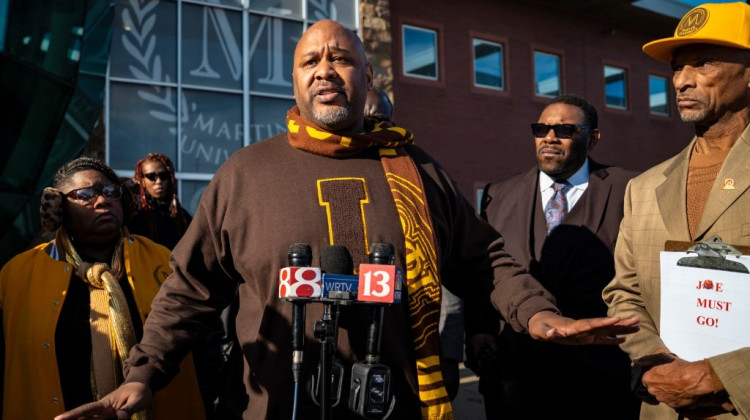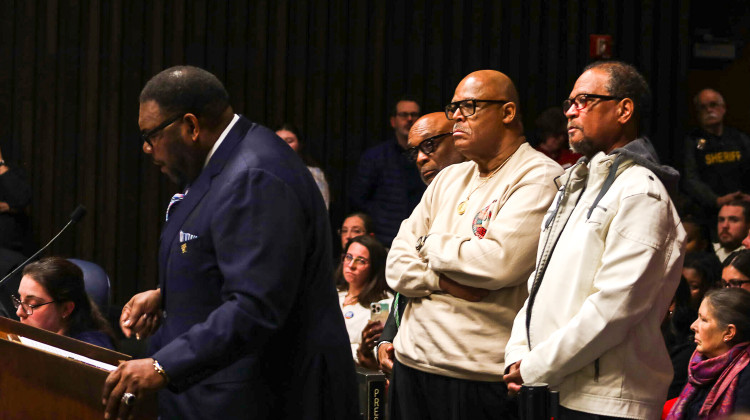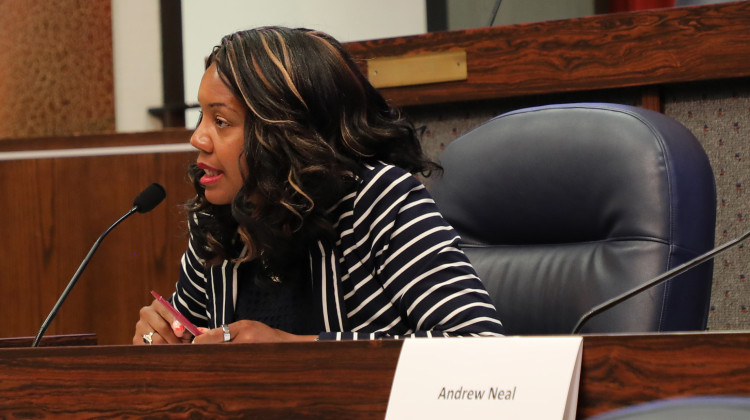
Rep. Robin Shackleford (D-Indianapolis), the chair of the Indiana Black Legislative Caucus, speaks during a State Conference of the NAACP media briefing Thursday, April 21, 2022 about a plan to improve academic outcomes for Black students.
(Greater Indianapolis NAACP/Facebook)Updated: 2:11 pm, April 24, 2022.
Black leaders from across Indiana called on Gov. Eric Holcomb and other state leaders on Thursday to prioritize ways to address the academic achievement gaps between Black students and their White classmates.
They want the state to adopt a plan developed by the Indiana State Conference of the NAACP to end negative outcomes for all Black students. The plan calls for sweeping actions to be taken by all levels of education, including increased efforts to promote culturally responsive learning, hiring more and retaining underrepresented teachers and a requirement for children to attend full day kindergarten.
Read more: Read the Indiana Black Academic Excellence Plan
The report also calls for the creation of a statewide educational equity officer, who would oversee strategies to address achievement gaps, training and other issues.
“Our ultimate goal is to eliminate disproportionalities resulting in inequities and negative outcomes for our Black children as measured by the test the state gives,” said Gwen Kelley of the Greater Indianapolis NAACP, the lead editor of the plan.
Black students score far below White students on Indiana’s standardized exam, which is used as a local and federal benchmark for academic proficiency.
Before the pandemic started, ILEARN test show nearly 15 percent of Black students passed both the mathematics and English portion, compared to nearly 43 percent of White students. During the pandemic, 2021 ILEARN test results show 8 percent of Black students passed both the mathematics and English portion, compared to nearly 35 percent of White students.
Pandemic disruptions lead to a disproportionate impact on Black families. In Indianapolis they faced an increase in unemployment and housing loss. At the same time, chornic absenteeism doubled among Black students in 2020-21 academic year.
The NAACP's plan calls for the Indiana Department of Education to lead the effort to increase Black students’ test scores by double digits over the next six years. This includes the department following its own plan to adhere to the federal Every Student Succeeds Act. Indiana officials told the U.S. Department of Education in 2018 it would close the achievement gap in English and math for all student groups in high school by 50 percent by 2023, and by 2026 for elementary and middle school students.
“We hope this plan will be widely shared and used as a foundation to bring about dramatic changes in our educational system across the state,” Kelley said. “As our Black children do better … all of the strategies in the plan will lead to a wider success for all of our students.”
IDOE spokesperson Holly Lawson said the department is focused on supporting student learning and opportunity and elevating the educator profession, among other pimary goals. Katie Jenner is in her second year as the state's first appointed Secretary of Education.
"The priorities of the NAACP and other partners across the state continue to shape IDOE’s work alongside Indiana’s schools to help open doors of opportunity to all students through education, including our students who face some of the greatest challenges," Lawson said in a statement.
The 43-page report offers recommendations for community members, local schools, lawmakers and the state departments.
Rep. Robin Shackleford (D-Indianapolis), the chair of the Indiana Black Legislative Caucus, said the plan is a start in addressing equity in the state. She said the caucus will make education its top priority in the next session of the General Assembly.
Indianapolis Public Schools Superintendent Aleesia Johnson joined leaders from other organizations such as the Indiana State Teachers Association and the Indianapolis Urban League in endorsing the plan during a media briefing Thursday. Around 75 percent of IPS students are Black and Brown.
"We should not accept as normal the data that overwhelmingly demonstrates we must act with boldness and with urgency to support all students in our state, particularly our African-Ameriacn students,” Johnson said.
Other organizations are also raising the alarm on acdemic outcomes of the state's Black students last year. Last year, the Richard M. Fairbanks Foundation released a report that found Black and Hispanic K-12 students in Marion County are less likely to have access to high-performing schools and teachers with at least four years of experience.
Black students make up 12.5 percent of the 1.1 million K-12 students in Indiana.
Contact WFYI education editor Eric Weddle at eweddle@wfyi.org or call 317-614-0470. Follow on Twitter: @ericweddle.
 DONATE
DONATE






 View More Articles
View More Articles


 Support WFYI. We can't do it without you.
Support WFYI. We can't do it without you.